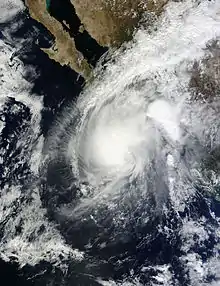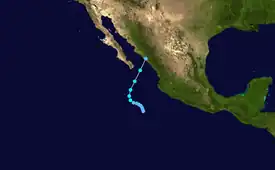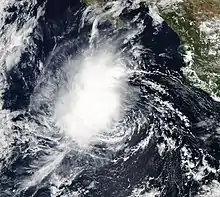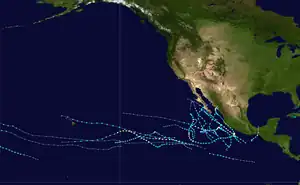Tropical Storm Sonia (2013)
Tropical Storm Sonia was a weak, late-season tropical cyclone that made a rare landfall in the Mexican state of Sinaloa during early-November 2013.[1]
 Tropical Storm Sonia approaching Mexico at peak intensity on November 3 | |
| Meteorological history | |
|---|---|
| Formed | November 1, 2013 |
| Dissipated | November 4, 2013 |
| Tropical storm | |
| 1-minute sustained (SSHWS/NWS) | |
| Highest winds | 45 mph (75 km/h) |
| Lowest pressure | 1002 mbar (hPa); 29.59 inHg |
| Overall effects | |
| Fatalities | 2 direct |
| Areas affected | Northwestern Mexico |
Part of the 2013 Pacific hurricane season | |
Meteorological history

Tropical storm (39–73 mph, 63–118 km/h)
Category 1 (74–95 mph, 119–153 km/h)
Category 2 (96–110 mph, 154–177 km/h)
Category 3 (111–129 mph, 178–208 km/h)
Category 4 (130–156 mph, 209–251 km/h)
Category 5 (≥157 mph, ≥252 km/h)
Unknown
The origins of Tropical Storm Sonia can be traced to a well-defined active phase of the Madden–Julian oscillation (MJO) that traversed eastward from the Central Pacific during late-October 2013. This was credited to the development of a very-broad low-level cyclonic circulation, over an area of nearly 15° of longitude well offshore Mexico. A tropical wave located several hundred miles to the south of Acapulco gradually entered the cyclonic circulation late on October 26, producing deep convection. Over the next couple of days convective activity halted, until becoming active again following the passage of the MJO on October 29, aiding the formation of a trough of low pressure. The trough slowly drifted northward in a passage between a mid-level ridge over the Gulf of Mexico and a deep mid-to-upper level trough over the Western United States.[1] At 6:00 UTC the next day, the National Hurricane Center (NHC) began to monitor the disturbance for potential tropical cyclogenesis over the next few days.[2]
Preparations and impact

In advance of Sonia, a Tropical Storm Watch was ordered for the coast of Sinaloa from Topolobampo to La Cruz, late on November 2.[3] This was later upgraded to a Tropical Storm Warning from Altata to Mazatlán, Sinaloa at 9:00 UTC the next day, with a Tropical Storm Watch remaining from Altata to Topolobampo.[4] Though just 24 hours later, all watches and warnings for Sinaloa were discontinued by the Government of Mexico.[5] An overall green alert was issued for Mexico by the Global Disaster Alert and Coordination System (GDACS), signifying a low-level of danger.[6] Secretariat of Security and Civilian Protection (SSCP) declared an orange alert for southern Baja California Sur, a yellow alert for central and southern Sinaloa, a green alert for northern Baja California Sur, northern Sinaloa, southern Sonora, southern Chihuahua, Durango, Nayarit, Zacatecas, and the Islas Marías. In addition, a blue alert was put in effect for central Sonora and central Chihuahua.[7] Ahead of the storm, classes were cancelled in five municipalities of Sinaloa. Local officials prepared more than 60 temporary shelters in Cabo San Lucas and Sinaloa.[8] The Port of Cabo San Lucas shut down on November 3 with the threat of Sonia, closing to ships with more than 500 tons (1 million lbs.) of cargo. Tourists boats meant for water activities were also prohibited from leaving port.[9] As a precautionary measure, over 1,000 residents were evacuated in the cities of Culiacán and Navolato.[10]
Sonia made landfall near El Dorado, Sinaloa as a rapidly weakening tropical storm on November 4, causing heavy rainfall over portions of Mexico.[1] Several inches of precipitation was recorded in Cabo San Lucas along with winds of around 30 mph (50 km/h), as the storm passed close to the resort city.[11] Heavy precipitation also occurred in the states of Nayarit, Jalisco, Durango, Chihuahua, and Aguascalientes.[12] In Nayarit, one person was killed after being struck by lightning according to the Secretariat of National Defense (SEDENA).[1]
See also
- Tropical cyclones in 2013
- Tropical Storm Norman (2012) — affected similar areas.
References
- Todd Kimberlain (January 8, 2014). "Tropical Cyclone Report - Tropical Storm Sonia (EP182013)" (PDF). National Hurricane Center. Retrieved March 20, 2021.
- Daniel Brown (October 29, 2013). "Graphical Tropical Weather Outlook". National Hurricane Center. Retrieved March 20, 2021.
- Eric Blake (November 2, 2013). "Tropical Depression Eighteen-E Forecast/Advisory Number 7". National Hurricane Center. Retrieved March 20, 2021.
- Stacy Stewart (November 3, 2013). "Tropical Storm Sonia Forecast/Advisory Number 9". National Hurricane Center. Retrieved March 20, 2021.
- Robbie Berg (November 4, 2013). "Tropical Depression Sonia Forecast/Advisory Number 13". National Hurricane Center. Retrieved March 20, 2021.
- "Overall Green alert Tropical Cyclone for SONIA-13". Global Disaster Alert and Coordination System. Retrieved March 20, 2021.
- NOTIMEX (November 3, 2013). "La tormenta tropical 'Sonia' avanza hacia Sinaloa y declaran alerta en Baja California". 20 Minutos (in Spanish). Retrieved March 20, 2021.
- Noé Torres of Reuters (November 4, 2013). "Tormenta tropical Sonia se debilita en el Pacífico mexicano cerca de la costa". Yahoo! Vida y Estilo (in Spanish). Retrieved March 21, 2021.
{{cite web}}:|author=has generic name (help) - "Tormenta Tropical "Sonia" amenaza a Sinaloa y Baja California Sur: SMN". AFmedios (in Spanish). November 3, 2013. Retrieved March 21, 2021.
- D.F. (November 4, 2013). ""Sonia" toca tierra como depresión tropical; evacuan a mil 100 personas". Proceso (in Spanish). Retrieved March 21, 2021.
- "Tropical storm Sonia hits Mexico, weakens". Christian Science Monitor. Associated Press. November 4, 2013. Retrieved March 21, 2021.
- "Tormenta Tropical Sonia Toca Tierra". Gobierno de México. Retrieved March 21, 2021.
External links
- The NHC's advisory archive on Tropical Storm Sonia
